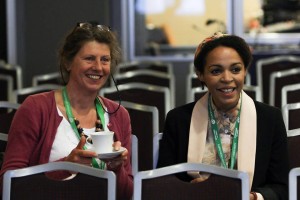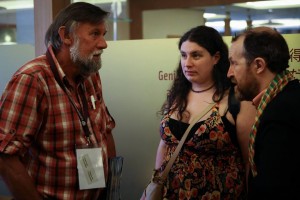The 22nd European Green Council

Taxiing along the runway as I was reading the proposed amendments for the upcoming 22nd European Green Party Council, a blonde haired gentleman nudged me on the arm and said ‘we’re heading to the same meeting’. He was from Socialistisk Folkeparti (the Danish Green Party affiliated to the Greens/EFA in the European Parliament) and introduced me to his colleagues. We began to discuss the ins and outs of the recent UK election and I began to realise that the European Green Party Council in Zagreb will be a truly international affair.
The council took place from 15-17 May 2015 on the outskirts of the city centre of Zagreb, nestled in a hotel situated amongst a hotchpotch of soviet-style office buildings and apartment blocks. The delegation, formulated of over 40 member states boasted representation spanning the entirety of Europe; from Scotland to Slovenia, delegates milled around the hotel lobby, quaffing coffee and indulging in endless conversation about The Green Vision.
Council was opened with a rousing speech from Reinhard Bütikofer, co-chair of the EGP, rekindling memories of his great speech at our own conference in March earlier this year. Next came a word of welcome from Mirela Holy, leader of OraH, the Croatian Green Party and our hosts for the weekend. She laid out the problems ORaH face, with the growing possibility of oil and gas drilling commencing in the beautiful Adriatic sea. Then as a maelstrom of press fired into action, the President of Croatia, Kolinda Grabar-Kitarović took to the stage; anointing our event as an almost regal affair. After the applauds and applause, business began.
The first major discussion was entitled ‘Green Strategy: Ideas To Change The EU’. Having just finished our own election campaigns, the English contingent were keen to be involved. The discussion was born out of the slightly disappointing results in the previous EU elections and, looking forward, how we can improve our standing in Europe in the years to come. What I found most interesting were the discussions around ‘establishmentarianism’ by which many of our sister parties in western Europe have found being a sizeable part of government has ultimately resulted in them being viewed as an ‘establishment’ party; something I think we steer well clear of here in the UK – if only thanks to our retrograde electoral system.
And that electoral system, First Past The Post, never failed to garner responses of faint disbelief from our european comrades. ‘But that’s so undemocratic!’… ‘People must feel underrepresented!’ … ‘That system is so silly!’ Just a few of the comments I received when explaining the system under which we elect our government.

Populism was a recurring theme both in the plenary sessions and the fringe ‘parallel’ sessions. Initiated by the rise of leftist parties such as Syriza and Podemos, much discussion centred around how we, as a Green Family, can build our support in the current political climate and maybe harness the strategies used by such parties. However populism has a much darker side; speaking with delegates from Hungary, France and Greece, the rise of the far right is a worrying trend across Europe. A perfect storm of high youth unemployment and wily, populist parties, with violent right wing agendas, have led to a growing trend of fascism and anti-immigration, most worryingly amongst young voters. The Green Party of England and Wales, most notably the Young Greens have done a wonderful job here in the UK in galvanising youth movements to consider Green Politics and maybe anti-fascist and anti-austerity groups have large youth followings. A stark contrast when listening to our friends on the continent.
The main purpose of the council was to elect a 9th committee member. Candidates came mainly from the eastern half of Europe and each made great presentations, showing that the green vision extends well beyond the confines of the west. After a suitably efficient voting session (great use of digital voting – something I’d love to see at GPEW conference!) Maria Peteinaki from Greece was voted in after a high race with the Hungarian candidate, Peter Ungar. Maria is an architect in Athens and told me how she faced first hand the fall of the economy and running her own office has been more difficult than ever. She told me how she had helped with many grassroots projects across the city, and highlighted how important community projects can be in austerity ridden times. However she went on to say that the Syriza government have given many people hope, buoyed by an antiausterity rhetoric. Business in her own field has started to pick up, with many of her jobs being in the renovation sector. A recurring theme when speaking with delegates was the emphasis European governments have put on renovation projects as opposed to brand new building endeavours. However a quiet walk around Zagreb tells a different story, with many buildings falling into dilapidation as the Croatian economy enters hard times. Indeed much of eastern and southern Europe have suffered under repeated austerity projects and the continuing rise in unemployment shows little signs of success. As we approach another five years of austerity here in the UK it is more important than ever that we remain the strong anti-austerity voice and work within our communities to help each other in trying times.
On reflection, the 22nd European Green Party Council taught me much about how our Green Family are faring across Europe. We are so unique to have this tight network of enlightened minds, dedicated to the green vision and the philosophical basis of our parties. As we approach an impending European referendum, as Greens of England and Wales we should grasp onto this network, share resources and garner support in these fractious upcoming times.




Socialistisk Folkeparti – SF (Socialist People’s Party) is not the Danish Green Party! SF is only an observer in the European Green Party and not a full member. De Grønne (The Greens)now know as Det Grønne Parti (The Green Party) are the Danish Green Party and were a founding member of the European Green Party, from which it was expelled in 2008 http://another-green-world.blogspot.co.uk/2008/03/danish-greens-challenge-expulsion.html. The only reason SF were on the same airplane (very green!), was because in 2004 SF’s sole MEP Margrete Auken decided to sit with the Greens–European Free Alliance group in the European Parliament, after falling out with the United Left/Nordic Green Left group.
Hi Grønne, I do apologise I was only reporting from what I was informed at conference and from what I believe SF were initiated as full members at the conference. The text in the article has been altered accordingly.
Thank you for bring this to my attention, I will endeavour to check my facts more vigorously in future